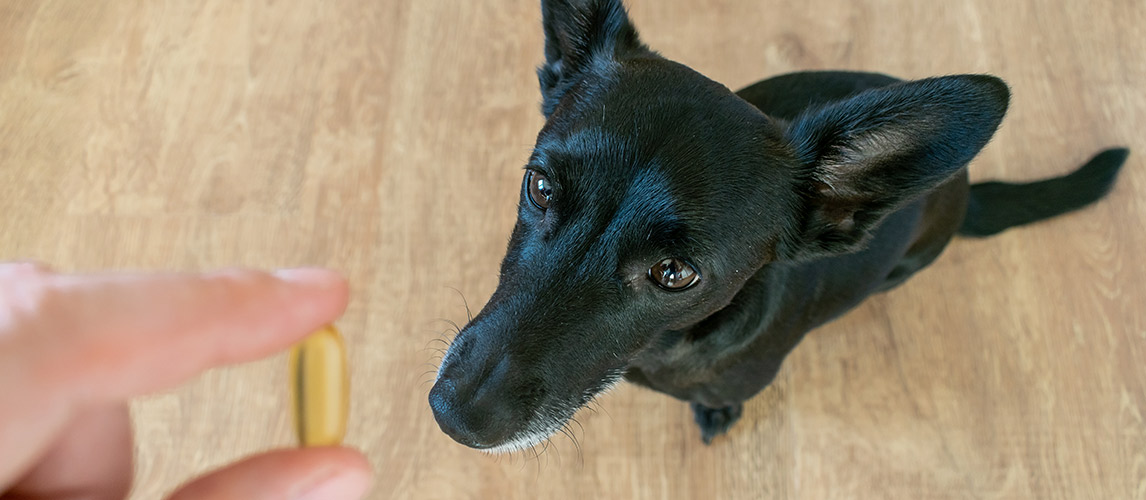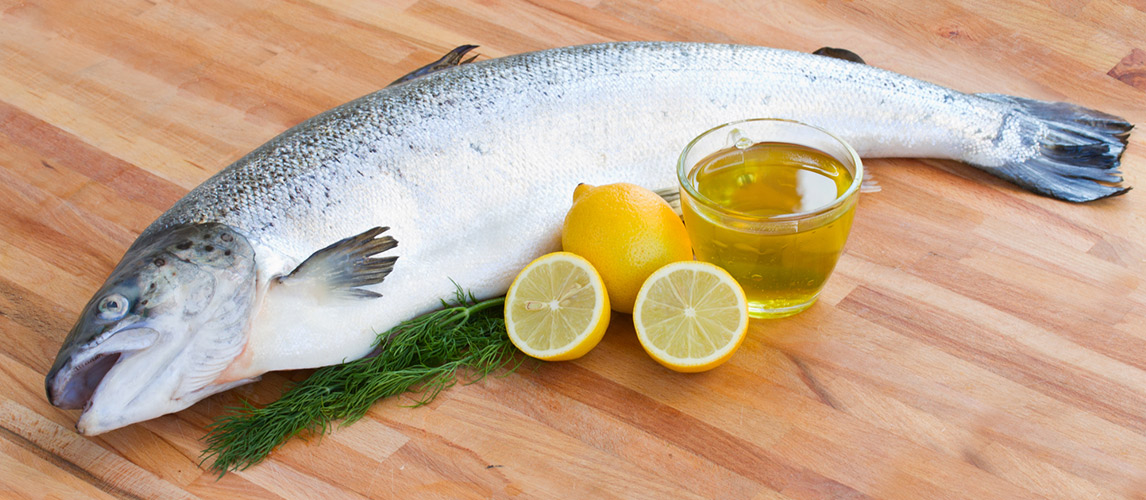Coconuts are largely considered one of the healthiest foods around. From its flesh down to its water, it contains a lot of vitamins, electrolytes, and minerals necessary for health. Its oil is also used in many applications whether it is for culinary or medicinal purposes. Dogs, too, can benefit from the introduction of coconut oil into their diets or applied onto their coat and skin as this is naturally rich in medium-chain triglycerides that can help promote healthier and shinier coat, prevent liver disease, reduce stress, and provide energy. However, not all coconut oil products are manufactured in the same way. There will always be products of mediocre quality. Hence, it is important that you know how to choose the best coconut oil for dogs. To point you in the right direction, we have here some of the canine world’s best and most trusted coconut oils. Check them out.
The 12 Top-Rated Coconut Oils for Dogs
1 Viva Naturals Coconut Oil For Dogs
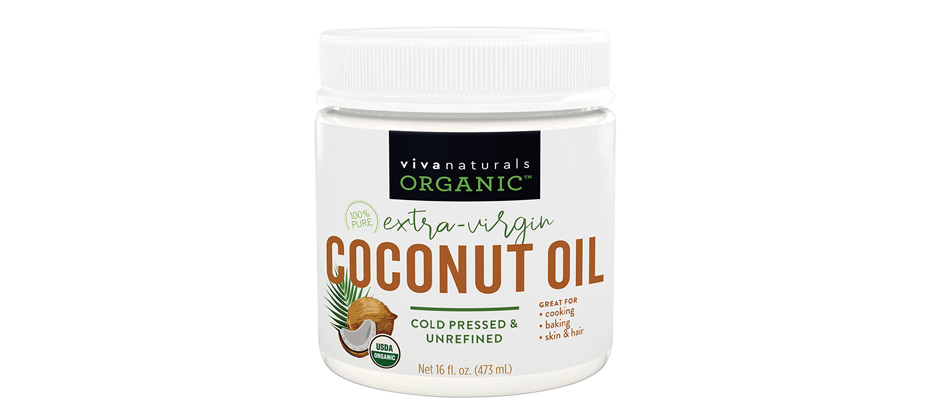
- Unfiltered and unrefined manufacturing process
- Proprietary cold-press essential oil extraction process
- Certified organic by QAI
- Contains no gluten or GMO ingredients
- Kosher certified
- Free from trans fats, hexanes, and / or bleach
It may be designed specifically for human consumption, but the Viva Naturals Organic Extra Virgin Coconut Oil can be considered the best coconut oil for dogs, too. Since the Viva Natural organic coconut oil is unrefined and has been cold-pressed for optimum preservation of its medium chain triglycerides, you can bet that it is safe for your mutt. The Viva Naturals is made of only the finest palm fruits, harvested by hand from the sustainable plantations in the Philippines, and undergoes a process that doesn’t include anything manmade. The palm fruits are harvested by hand at their peak freshness before these are extracted into the purest possible form of oil.
The product can be used in a variety of ways for your pet. It can be added to its regular diet so it can benefit from the healthy MCTs. It can also be applied onto your mutt’s coat to give it more shine and luster. It is also a good way to moisturize your mutt’s skin and can be very helpful if it has incessant itching or other skin problems. For obese pets, the action of MCTs on metabolism can help burn more fat leading to a reduction of weight and the achievement of an ideal body weight for your pet.

2 Nutiva Organic Coconut Oil For Dogs
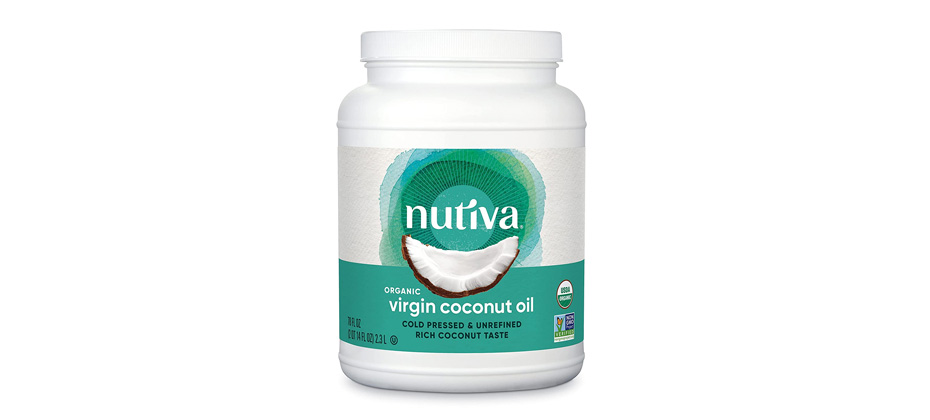
- Made of cold-pressed virgin coconut oil
- Contains 63% medium-chain triglycerides
- Non-GMO, vegan formulation
- USDA-certified organic
Nutiva’s Organic Virgin Coconut Oil has almost the same characteristics as the Nature’s Way EVCO.
It also has almost the same composition of medium-chain triglycerides in a vegan, non-GMO formulation. It is also certified by the USDA as organic so you’ll feel more at ease whenever you give a teaspoonful of this oil to your dog or even mixed with its food.
Like all coconut oils, Nutiva can also be applied topically on your pet’s skin as well as its coat, perfect for managing hotspots and problem areas on its paws.

3 Nature’s Way Extra Virgin Coconut Oil
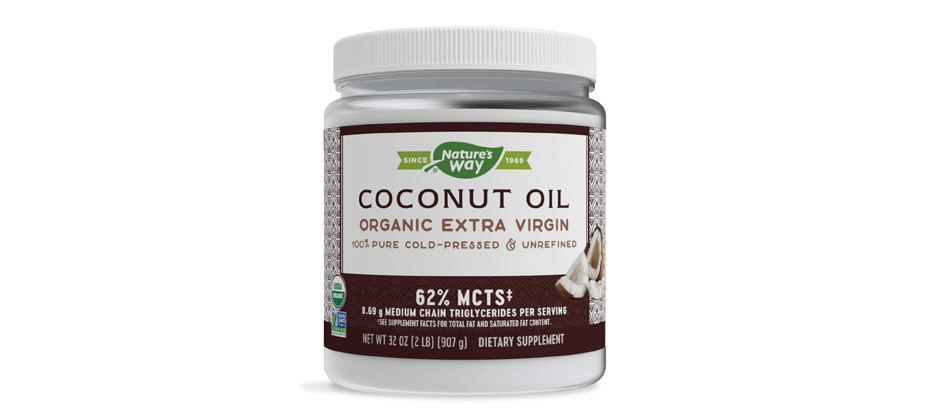
- Made of cold-pressed extra virgin coconut oil
- Contains 62% medium-chain triglycerides
- USDA-certified organic
- Non-GMO, gluten-free, hexane-free formulation
Nature’s Way Organic EVCO is one of the most trusted names when it comes to excellent-quality coconut oil. Its composition is made up of 62% medium-chain triglycerides, equivalent to about 8.6 grams, to provide your pet with the many benefits associated with the mechanism of action of coconut oil.
Pet parents can have peace of mind knowing Nature’s Way is pure and contains no gluten or hexane. It doesn’t contain GMO ingredients as well. It’s a good product to maintain your pet’s healthy coat and skin while also giving it the chance to boost its body’s natural defenses.

4 Raw Paws Organic Coconut Oil For Dogs
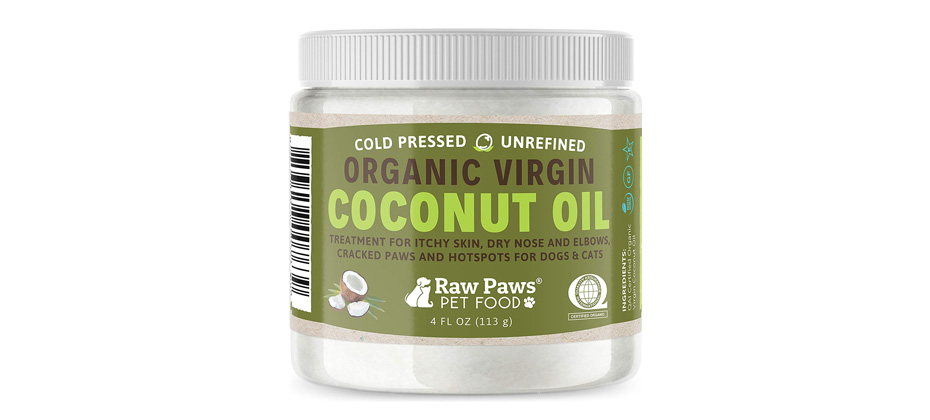
- Unrefined and organic virgin coconut oil
- Cold-pressed for quality
- Soothes, moisturizes and heals skin
- Can also be used as a digestive supplement
Perfect for treating skin hotspots as well as a coat conditioner, this organic coconut oil from Raw Paws is a class act. Made from unrefined virgin coconut oil, cold pressed for a premium product, it soothes, heals, moisturizes and cleanses. You can also use it as a supplement to soothe their digestion and boost their immune health.
As a hardworking coconut oil for dogs as well as cats, Raw Paws is also high in Lauric Acid and is safe to use as a healing skin balm. And while the pot is on the small side, a little goes a long way, making this quality coconut oil a decent investment for your pet.
Read here our guide on Conditioners for Dogs.

5 Alpha Pet Zone Coconut Oil For Dogs
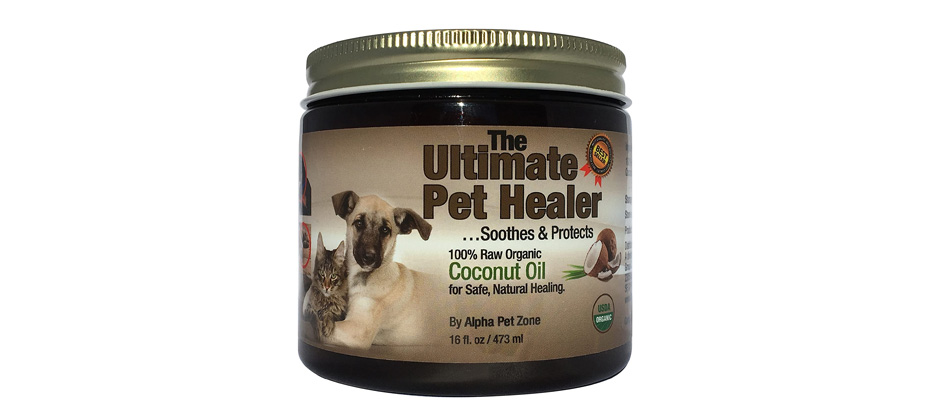
- 100% raw and organic virgin coconut oil
- Unrefined, unbleached, undeodorized
- Certified vegan
It’s safe and provides a more natural healing for your pet dog. That’s what The Ultimate Healer offers pet parents the world over. It doesn’t have ‘extra virgin’ on its label but it sure is trusted by many pet parents when it comes to providing soothing relief to their dog’s skin conditions, improving digestion, and enhancing immunity.
The Ultimate Healer is made from pure and raw coconut oil sourced from organic coconuts. You’ll feel safer, too since it comes as unrefined and unbleached so you get all the benefits your pet deserves. It’s the perfect natural remedy for itchy and irritated skin while leaving the dermis more nourished and vibrant than ever.

6 Zesty Paws Organic Extra Virgin Coconut Oil For Dogs
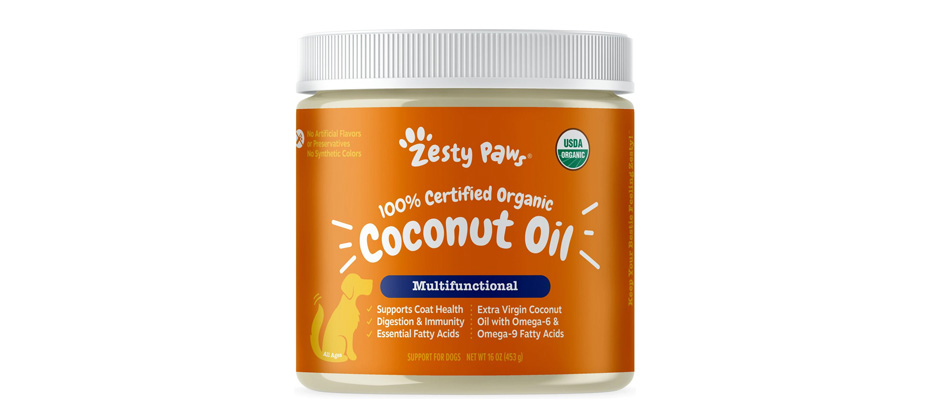
- 100% organic
- Contains 3000 mg of medium chain triglycerides
- Gluten-free, preservative-free
- 100% lifetime guarantee
For optimum coat and skin health as well as optimal immune system functioning, you may want to give your pet the Zesty Paws EVCO. Like all products in this list, Zesty Paws come in as an unrefined coconut oil sourced from organically-grown coconut trees.
Its extra-virgin preparation helps ensure you get the most out of its nutrient benefits, especially its medium-chain triglycerides. When it comes to the concentration of MCTs, however, we’ve seen better. Nevertheless, Zesty Paws provides a lifetime guarantee that you won’t see in other products.

7 Petpost Skin & Coat Coconut Oil For Dogs
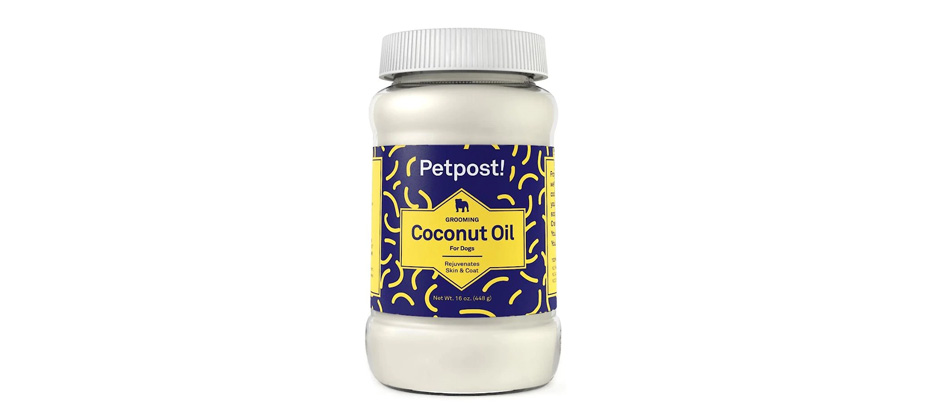
- 100% organic, extra-virgin coconut oil
- Contains 9 grams of medium chain triglycerides
- Gluten-free, non-GMO
- Cold-pressed technology
- 100% money –back guarantee
Petpost’s EVCO prides itself of being sourced from organic coconuts to provide pet parents with a product that is perfect for the management of a variety of skin and digestive problems as well as boosting their pet’s immune system. Whether given as is or mixed with your pet food or even applied onto its coat and paws, Petpost’s EVCO is sure to provide a host of benefits courtesy of its medium-chain triglycerides and vitamins.
Incidentally, Petpost EVCO contains one of the highest concentrations of MCTs per serving at 9000 milligrams. It’s effective enough that Petpost is more than willing to return your money in case you’re not satisfied.

8 CocoTherapy Virgin Coconut Oil For Pets
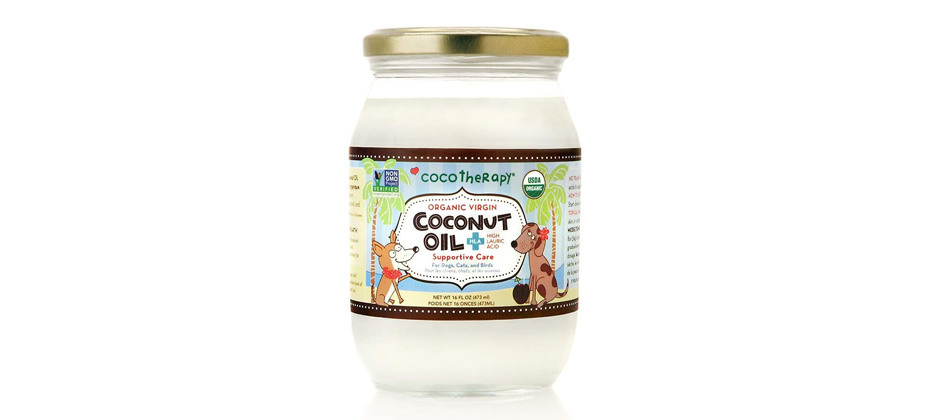
- Palm fruits sourced from single family-run plantation
- High concentrations of lauric acid and medium chain triglycerideFormulated specifically for pets
- Certified organic by the USDA
If you’re wary about using human-grade virgin coconut oil for your pet, then you may want to purchase the CocoTherapy Organic Virgin Coconut Oil for Pets instead. It contains on the average 64% of medium chain triglycerides plus about 53% of lauric acid which is a fatty acid that is known to have amazing antibacterial, antifungal, and antiviral properties. This should be welcome news for pet owners who may have dogs that are more predisposed to microbial infections than other pets.
One of the most interesting facts about CocoTherapy is that the palm fruits used in its formulation and manufacture come from a coco palm tree plantation or farm run and managed by a single family. As such, you can bet that the batches of coconut oil they produce are of the highest possible quality since there are no fruits that are sourced elsewhere. This helps guarantee uniformity of the products’ nutrient profile. It’s certified organic by the USDA, too. At any rate, this gives you the confidence that your pet will be receiving all the different benefits of VCO as the CocoTherapy is especially formulated for pets and not really for humans.

9 Island Fresh Organic Virgin Coconut Oil
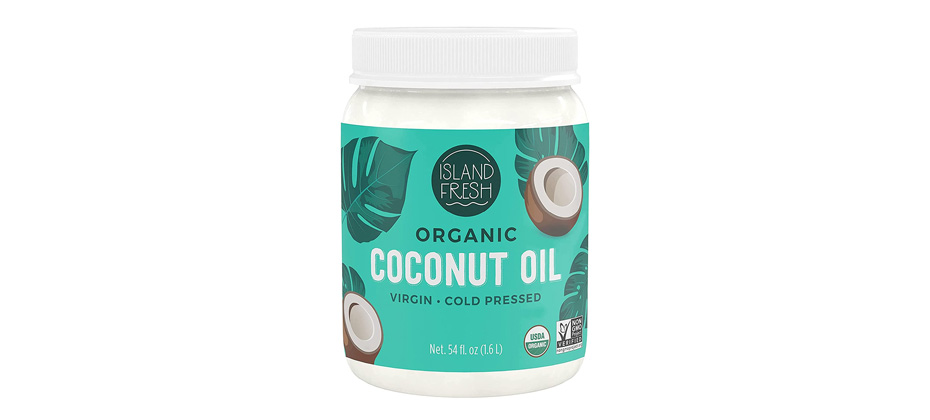
- High concentrations of medium chain triglycerides and fatty acids
- Certified to be non-GMO
- Extracted using proprietary cold-pressing technology
- Certified organic
Like Viva Naturals, Island Fresh is not really formulated for pooches. However, it does contain all the right amounts of MCTs without nasty artificial ingredients to make it a safe coconut oil for dogs. It also contains lauric acid which, as we already know can be very beneficial for its antimicrobial properties.
The overall effect of the Island Fresh is thus, very similar to the rest of the products in this list. Each coconut fruit is cold-pressed to make sure that all the important nutrients are locked in, giving you only the highest possible quality of MCTs. It’s particularly useful for making your pet’s coat achieve its optimum shine and health. It can be mixed with its dog chow, too for

10 Carrington Farms Coconut Oil For Dogs
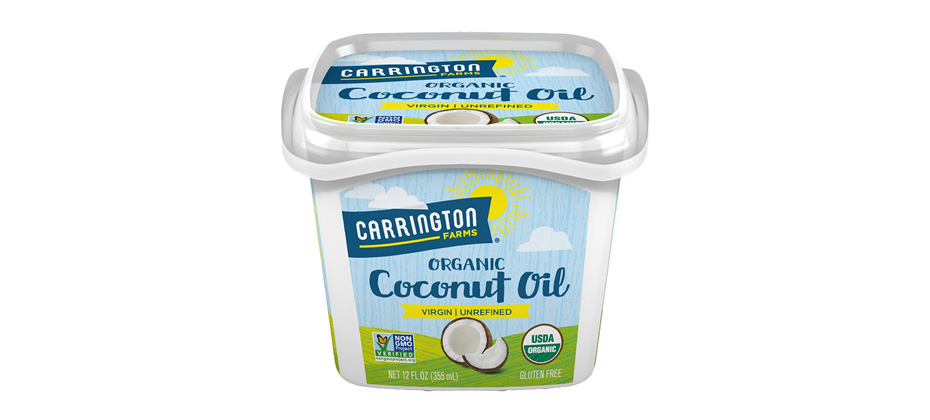
- Cold press extraction methodology
- High levels of MCTs and fatty acids
- Unrefined and unadulterated manufacturing
- Non-GMO and gluten free
- Contains no trans fats and hydrogenated fats
- Certified organic
- Kosher certified A
Also a product from the Philippines, the Carrington Farms Organic Extra Virgin Coconut Oil may be primarily intended for human consumption, either as a healthier alternative to traditional cooking oils or as a natural emollient for a host of health problems, but it sure can pass as one of the best coconut oil for pooches because of its very safe profile.
The Carrington Farms VCO is guaranteed to be free from GMO ingredients, unhealthy trans fats, and even hydrogenated fats. The secret is in the process of cold-press extraction without subjecting the palm fruit to extensive refining methods so you get only the best, most unadulterated form of MCTs and lauric acids as well as other fatty acids. The Carrington Farms VCO is also free from gluten so you can safely give it your pooch without worrying about your pet having allergies later on. It is also Kosher certified and guaranteed to be genuinely organic.

11 Wholistic Pet Organics Coconut Oil For Dogs
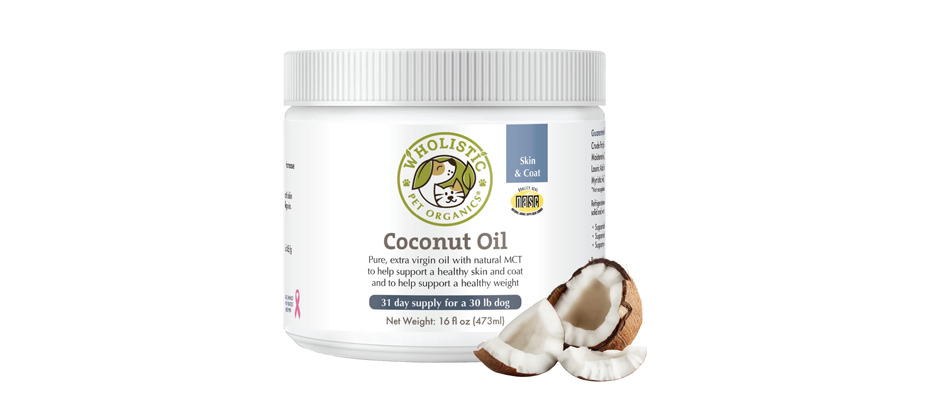
- Fortified with essential fatty acids complementing its MCTs
- Sourced from fresh coconuts
- Unrefined fully organic coconut oil
- Non GMO
The Wholistic Pet Organics Coconut Oil is a specially designed formulation of pure coconut oil that is packed with omega-6 and omega-9 essential fatty acids for amazing health benefits to your dog. Omega-6 can have a host of anti-inflammatory properties while omega-9 fatty acids are known for their capacity to boost the functioning of the immune system.
These are, of course, in addition to the many health benefits of medium chain triglycerides of which coconut oil has plenty of. The excellent mixture of different types of healthy fats make the Wholistic Pet Organics to be especially helpful in supporting and maintaining beautiful coats, healthy skin, more efficient metabolism, healthier cardiovascular system, and improved immune functioning. The Wholistic Pet Organics is guaranteed made of only the freshest coconuts harvested from sustainable farms.

12 Raw Paws Virgin Coconut Oil For Dogs
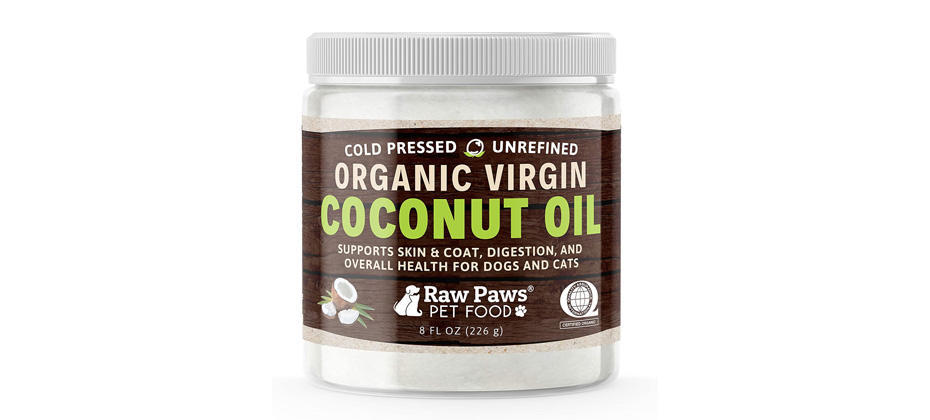
- Made of fresh, plantation-harvested coconuts
- Certified organic by the USDA
- Cold pressed and unrefined
- Veterinarian recommended
It boosts your pup’s immune functioning while also helping hydrate its skin. At the same time, it can also help soothe itchy skin while also helping eliminate bad breath from your pet. In some cases, it might even help deter fleas, mites, and ticks from ever infesting your pooch. These are just some of the published benefits of Raw Paws’ organic virgin coconut oil. While it is perfectly okay to use VCO designed for men, it would give you more peace of mind if you knew that the product you’re giving to your mutt is inherently formulated for it.
The Raw Paws can be added directly onto your mutt’s food or fed directly to your pet using a spoon. The mere fact that you can put oil in dog food makes it a lot easier to administer such healthy oils to promote a healthier digestive system. The Raw Paws is also slightly less expensive than the other two coconut oil for dogs on this list. At least, you can bet that it’s good for Fido.

Best Coconut Oil for Dogs: Buying Guide & FAQs
When you go to your favorite grocery store or even health food shop you’ll most likely be presented with a host of products that technically look the same. After all, they are all made of coconut oil, right? So how different can one product be from the rest if it is essentially composed of the same principal ingredient? As it turns out, much of the difference lies in the manufacturing process upon which these products are subjected to. Here, we will examine some of the things that you really need to keep in mind when shopping for the most appropriate coconut oil for your pooch.
Natural or Refined?
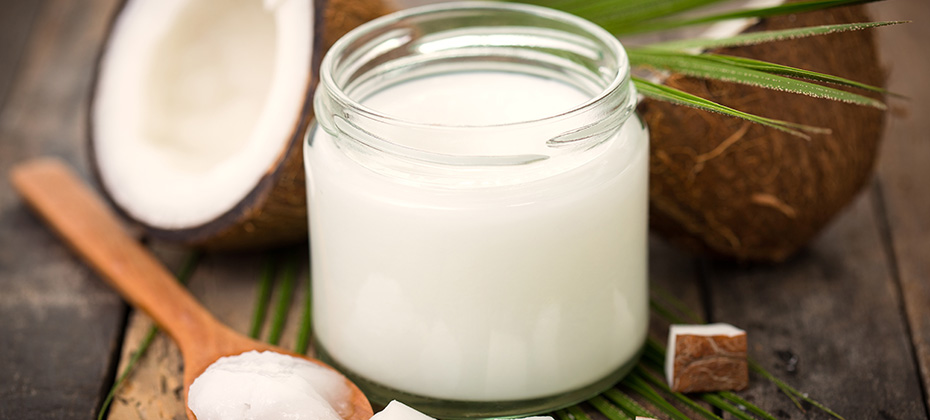
One of the things that you will find in these products is that they are available in either natural or refined. Technically, they both contain medium chain triglycerides. However, because of the differences in manufacturing processes, one will often have a much lower concentration of MCTs compared to the other. To understand the unique differences between these products, it is important to understand the different processes involved in making coconut oil.
- Natural or Unrefined: Natural products do not undergo considerable processing. In fact, they are often derived using a wet-milling process that extracted the oil from the flesh or meat of fresh mature coconuts. The oil content of the coconut milk is separated from the water using a variety of methods including fermentation (the best method), boiling, refrigeration, mechanical centrifugation, and enzymatic reaction. Studies show that coconut oil extracted through this very traditional, age-old fermentation method is the best way to retain the full nutritional profile of the coconut oil including a full spectrum of fatty acids and antioxidants.
Other natural methods included drying the coconut meat first before they are ‘pressed’ to extract the oil. This offered the ability to mass produce coconut oil as doing it the traditional wet milling process somehow reduced the efficiency of production. Unfortunately, however, one can only produce a limited amount of oil using the wet milling method.
Be very careful about brands that are labeled as ‘cold pressed’. While these are processed using the natural method or wet milling, most are often accomplished in combination with other methods. This is to allow for the mass production of coconut oil while maintaining a fairly high amount of antioxidants and fatty acids. Again, even cold pressing technology is no match to the age-old tradition of fermenting coconut oil.
Sadly, many have begun to equate cold-pressing technology to be far superior. It is, of course, especially when compared to refined oils. However, if you could get your hands on coconut oil that is done in an old-fashioned way, you’d be better off with this. Regrettably, it really is very rare to find one, unless you can travel to some far-flung community in the Philippines and let them make you one.
- Refined: As the name implies, refined coconut oil has undergone some serious processing before it is made available for consumption. These are often made from the dried kernel of coconuts known as copra. The extracted oil from copra has to undergo purification to make it more suitable for consumption. Hence, it is refined.
- Hydrogenated: There was a time when hydrogenated coconut oil was abundant in market shelves. These contained trans fatty acids that have been found to be unhealthy versions of fat. Good thing these are now mostly found in candy bars that depend on a non-melting coconut oil.
- Fractionated: These are also known as MCT oil. The term fractionated comes from the fact that coconut oil has to be processed further to remove its lauric acid content so you only get the medium chain triglycerides. In fact, what you may find appealing in fractionated coconut oil is that it stays liquid even at lower temperatures where conventional coconut oils will already turn solid.
Virgin or Extra Virgin?
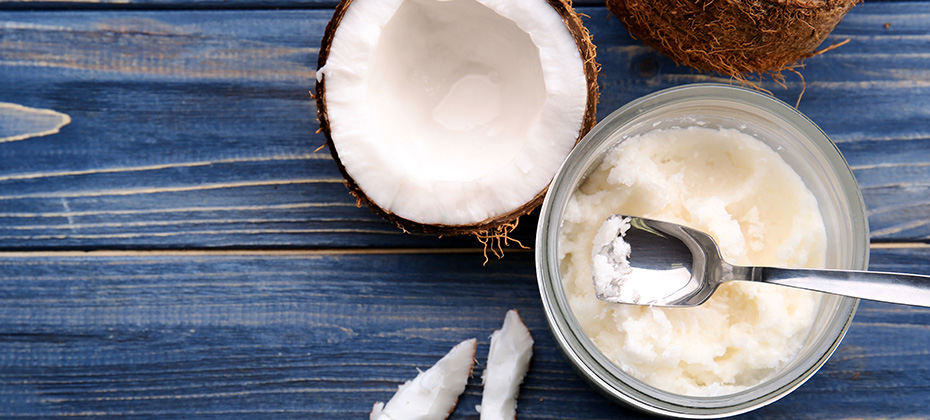
First and foremost, coconut oil IS NOT olive oil where you can have virgin and extra virgin classification. Science has shown that there is actually no difference between virgin coconut oil (VCO) and extra virgin coconut oil (EVCO). So what’s the difference then? To be frank, it’s all a marketing ploy to help drive sales to a product that is sufficiently priced higher than a similar product that only has a VCO label.
But in all actuality, it makes perfect sense. If extra virgin olive oil can command a higher price tag because of its supposedly higher nutrient profile, then it should work particularly well for coconut oil that has the same labeling. Just try looking at the price of a VCO and an EVCO and you’ll see a substantial difference. Now, if you were the company that produces VCO and you would like to get a better bottom line, would you not also put the EVCO label on your products?
That being said, you will definitely fare a lot better with a VCO product. It has essentially the same nutrient profile as an EVCO but with a price advantage, you will love. If anything, it is the difference between natural and refined that you have to focus on.
Non-GMO
There is a growing concern on genetically modified organisms being included into a variety of products, coconut oils for dogs included. While there are a lot of conflicting claims as to the advantages and disadvantages of GMO products, it will be a lot better to stay on the safe side until such time that even the scientific community stands united in saying that GMO products are safe or otherwise.
Certified Organic
Technically, organic products are those that are grown and harvested using very traditional methods of propagation and farming. While other companies use pesticides and fertilizers, these organic products are sourced naturally from the environment. True organic farmers don’t use artificial or synthetic chemicals to get rid of pests or make the soil fertile for coconut trees to grow.
That said, while coconuts may have been sourced from natural farms, it doesn’t necessarily mean that it is already organic. It is possible that even natural products may require some form of artificial assistance such as minimal chemical pesticides and the like. So, ascertaining the organic certification of a coconut oil for dogs is crucial to ensuring the safe use of such products on your pet.
Take a look at our article on the Best Dog Joint Supplements.
Benefits of Coconut Oil for Dogs
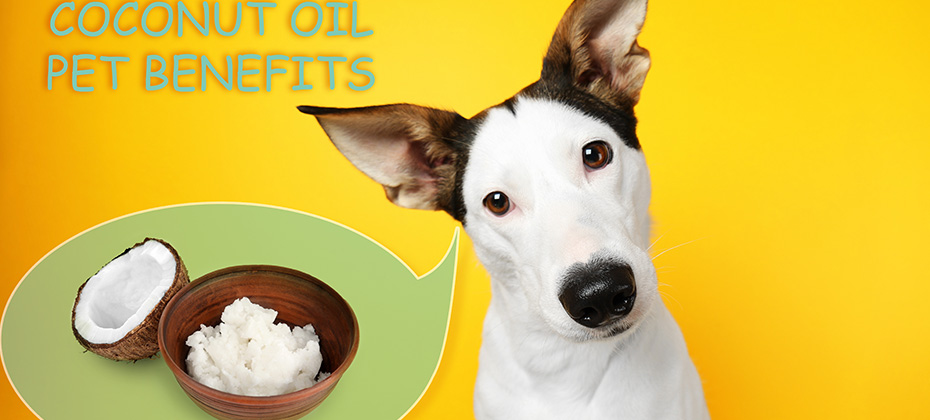
Coconut oil is highly regarded as one of the healthier versions of fat that we can either include in our diets or apply to specific organs of our body such as the skin and hair. Because of the many health benefits of these kinds of products to man, it is natural to think that it should also be good for our pooches. But exactly what are the benefits of coconut oil for dogs?
The coconut oil benefits for your pet dog are inherently related to the excellent concentration of medium chain triglycerides in the oil. These types of lipids have been well-studied to provide a host of advantages over other types of fats. Medium chain triglycerides also contain lauric acid, which has been shown to exhibit antimicrobial properties. We’ve summarized the coconut oil benefits in the following.
- Skin and coat health
One of the proven coconut oil benefits to dogs is an improvement in their coat and skin health. Coconut Oil has been used in the management of canine eczema, contact dermatitis, itchy skin, and even flea allergies. It has also been shown to be especially effective in mitigating skin allergies while improving the overall health of the skin. Coconut oil can also help make a canine’s coat sleeker, healthier, shinier, and glossier. Plus, it can also help moisturize or hydrate hair. In many instances, the lauric acid content of coconut oil has been used in the prevention and treatment of fungal infections as well as the infestation of mites, fleas, and ticks. Additionally, it can also help disinfect wounds or cuts while promoting faster wound healing. High-quality VCO can also help get rid of the characteristic odor of dogs while allowing dry and cracked paw pads to heal more efficiently.
Check out this article on Paw Protection Waxes For Dogs.
- Better digestive health
The medium chain triglycerides of coconut oil have been proven to improve the ability of the canine digestive system to absorb various nutrients while also improving overall digestive processes. It can also aid in the reduction of symptoms associated with colitis and inflammatory bowel syndrome as well as other disorders of the digestive tract. Dogs that have intestinal parasites will benefit from an oral administration of coconut oil as its lauric acid content can help kill and expel these microorganisms from the gut. Coconut oil is also helpful in eliminating bad breath which can stem from bacteria that have colonized the gastrointestinal tract.
- Enhanced immune system functioning
Lauric acid, as we have already said has antibacterial, antifungal, and antiviral properties that can help boost the ability of your pet to ward off infections. There are also studies that show it might even help reduce the risk of developing certain forms of cancer.
- Better metabolism
One of the well-known benefits of coconut oil among humans is its ability to balance and regulate the action of insulin to help manage diabetes. It is also through its metabolic activity that coconut oil is believed to be helpful in losing weight. As such, obese dogs and canines that are predisposed to diabetes can benefit from the consumption of coconut oil.
- Musculoskeletal health
The antioxidants that come with natural coconut oil have anti-inflammatory properties which can be beneficial in reducing the symptoms associated with arthritis and other disorders affecting the joints of dogs. As a result, this can come in handy especially for larger pooches as they are more susceptible to bone and joint problems.
- Nervous system health
The MCTs that coconut oil has can help prevent senile dementia or forgetfulness in dogs while also improving their overall cognitive functioning.
Taking Care of Your Dog’s Paws with Coconut Oil
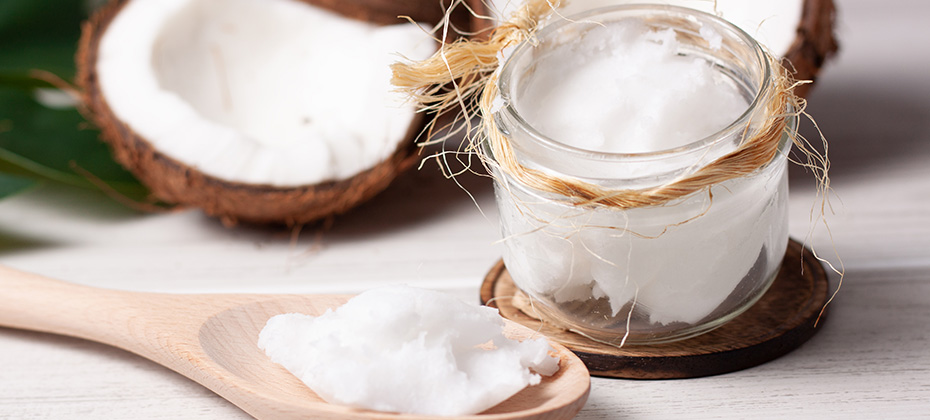
Coconut oil has amazing antimicrobial and moisturizing properties that work exceptionally well on dry and cracked paw pads. The MCTs, antioxidants and lauric acid of coconut oil can work their wonder on these dry tissues by hydrating them back to life and killing the microorganisms that may already be living within the cracks of the paw pads. It is often recommended that you apply generous amounts of coconut oil onto the paw pads and massage these gently to help bring back the more efficient circulation of blood.
Our Top Pick
There were a lot of products vying for the top position of the best coconut oil for dogs. However, after thorough deliberation with our editorial team, friends who are avid pet owners, and our resident animal experts, we’d have to listen to what majority of pet parents have to say. Since we’re essentially talking about a single-ingredient product, everything boils down to the positive experiences of pet parents. As such, our choice for the best coconut oil for dogs is the Viva Naturals Organic Extra-Virgin Coconut Oil. We know that it is essentially intended for human use, but it sure provides exceptional benefits to man’s best friend, too. It is cold-pressed, naturally preserving all the health benefits of organic, pure, unrefined, and unprocessed coconut oil. The best thing about it is that you can use it on yourself, too.
Sources:
- Aly Semigran, Coconut Oil For Dogs: Understanding the Benefits and Risks, PetMD
- Coconut Oil for Allergies in Dogs, Wag!
Frequently Asked Questions
There are no standards when it comes to coconut oil supplementation in dogs. However, to answer your question how much coconut oil should I give my dog, it is generally recommended that you can start with about 1 milliliter or about ¼ teaspoon of VCO for every 10 pounds of its body weight given daily. For large breeds, you can start with a teaspoon. This is to help avoid the passing of loose stools. Gradually increase the dosage until you reach about 5 mL or 1 teaspoon, or a tablespoon for large dogs, for every 10 pounds of your pet’s body weight per day.
However, if you intend to use coconut oil for therapeutic purposes, you may wish to double the dosage. Again, it is crucial to start with the smallest possible amount, working your way to its recommended dosage.
As we have already discussed, one of the benefits of coconut oil in dogs is related to their skin and coat health. As such, it is perfectly alright and is actually recommended to apply some onto your pet’s coat and massage onto its skin. The best way to do it is to apply liberal amounts of your chosen product and leave it there for about 5 to 10 minutes before washing and rinsing it off. Applying coconut oil onto your pet’s skin and coat can bring the life and shine back into this part of your canine friend’s body.
There are a variety of ways in which you can give coconut oil to your dog. Here are some of the more common ways.
- Simply mix the coconut oil with their regular food. Just make sure to follow the recommended dosing.
- You can use it as a dog treat where you can easily give them their favorite treats that have been coated with coconut oil.
- Generally, dogs love the taste and texture of coconut oil and as such, you can give this to them using a teaspoon or a tablespoon.
- For topical applications, coconut oil can be applied onto the coat and the skin in liberal amounts massaged gently and left to be absorbed before rinsing.
Just as coconut oil is beneficial for humans, it can also provide the same host of benefits for your dog. However, it is important to choose only those that are unrefined and contain no harmful ingredients. Since they are essentially the same thing, it won’t matter if the coconut oil is virgin or extra virgin.
Coconut oil, for all its wonderful benefits both to us and man’s best friend, needs to be taken in moderation. This is especially true in the case of our beloved pets that are more prone to obesity than others. While it is true that coconut oil contains medium-chain triglycerides that are way healthier than saturated fats, these are still fats that are exceptionally concentrated with calories. As such, if you fail to make the necessary adjustments in your pet’s diet, you are essentially courting canine obesity and an entire list of diseases and complications associated with the condition.
With regards to the frequency of using coconut oil on your dog, it all depends on the purpose of the application or the consumption. If the only reason for using coconut oil on your pet is to relieve or soothe hot spots or excessively irritated skin, then you should apply coconut oil every day until the problem is resolved.
Sometimes, your vet may also recommend a different frequency of application especially for mild to moderate skin conditions in dogs that may respond well to coconut oil application. In such instances your vet may order a twice a day or even three times a day application, often depending on the severity of the condition, the presence of other therapies, and the overall response of your dog to the treatment.
If the purpose of giving coconut oil to your dog is to obtain a more generalized, health-promotion effect, you will still need to give the formulation on a twice-daily basis. Normally, the oral dose for coconut oil is 1 teaspoon per 10 pounds of body weight or 1 tablespoon per 30 pounds of body weight. Again, depending on the condition of your pet, any existing medical concerns, body fat percentage, age, and activity levels, your vet may actually reduce the frequency to once every other day. In some instances where an increase in coconut oil consumption may benefit your pet, then your vet may actually recommend giving your pet a thrice daily dose of the formulation.
Coconut oil may be safe in the general sense. However, owing to canine differences, one dog may require a more frequent administration of coconut oil while others will benefit more from a reduced frequency. In general, the main point is to always consult your vet.
The quick answer to this is ‘yes’ you can add coconut oil to your pet’s food whether it is dry or wet. One of the best things about coconut oil is that it possesses anthelminthic properties. While the exact mechanism is not clearly understood, what is generally observed is that adding coconut oil to your dog’s food regardless of whether it is wet or dry can help facilitate the removal of intestinal worms from your dog’s gut. Now that is one of the clear benefits of giving coconut oil to your pet.
However, it is very important that you make the necessary adjustments in your pet’s calorie intake especially the fat content of its dog food. Again, just because coconut oil contains medium-chain triglycerides doesn’t mean you can ease up on watching its diet. Remember that MCT is just a component of coconut oil and there are other oils as well. In most cases, coconut oil for dogs can contain as much as 65% of medium-chain triglycerides with the remaining 35% being saturated fats.
You might also be interested in the following guides: Wet Dog Food and Dry Dog Food.
An infection, regardless of its location in the dog’s body, is caused by certain microorganisms that destroy body tissues. The destruction of the tissues releases a variety of substances that bring about the classic manifestations of inflammation such as redness, swelling, and pain. As such, the only way you can really address the problem is by giving your dog an antimicrobial agent that is highly specific for the organism that is causing the infection.
That said, while coconut does exhibit antimicrobial properties, these do not act with specificity to the possible causes of ear infections in dogs. For instance, the yeast Malassezia furfur doesn’t really respond well to coconut oil, even if you do decide to put copious amounts of it in your dog’s ear.
However, this doesn’t mean that coconut oil cannot be used as an adjunct to the management of the symptoms of dog ear infections such as drying and crusting of the skin and intense itching. Studies show that coconut oil can be an effective method for managing intense itching as well as reduce signs of skin irritation. As such, coconut oil can still be used to relieve some of the symptoms of infections in dogs.
But, if you think that coconut oil can replace conventional, empirical antibiotic treatments, then that is where you are wrong. It may kill ear mites, though as it tends to suffocate or drown out these parasites in your dog’s ears.
Read here our ultimate guide on the Best Ear Cleaner for Dogs.
Generally speaking, pure coconut oil is safe. The reason is quite simple – it doesn’t contain proteins that can be recognized by the dog’s immune system as allergenic. Some say lauric acid may contribute to a variety of manifestations that are taken as allergic symptoms. However, lauric acid is a medium-chain fatty acid and not an amino acid as some would claim.
So when does coconut oil become allergenic? Allergic reactions occur because of the presence of a protein molecule upon which immune system cells have been sensitized to. Since pure coconut oil doesn’t contain any recognizable form of protein, caution should be observed when buying coconut oil supplements as there is a possibility that these products are infused with other chemicals that may contain protein in the formulation. Regardless of how negligible the amount of such a substance is, one can never really predict how the dog’s immune system will react.
As such, if you’re concerned about your dog being allergic to coconut oil, just get the pure, unadulterated product and your pet should be fine.
However, aside from the concern about allergies, you might also be concerned about upset stomachs and diarrhea. These are usually a very common occurrence in diets that are very rich in fats. That is why you shouldn’t really give your pet more than necessary to help avert any potential problems. We did mention the usual range of dosing for dogs. You can always start with a much lower dose to check how your pet reacts to it.


